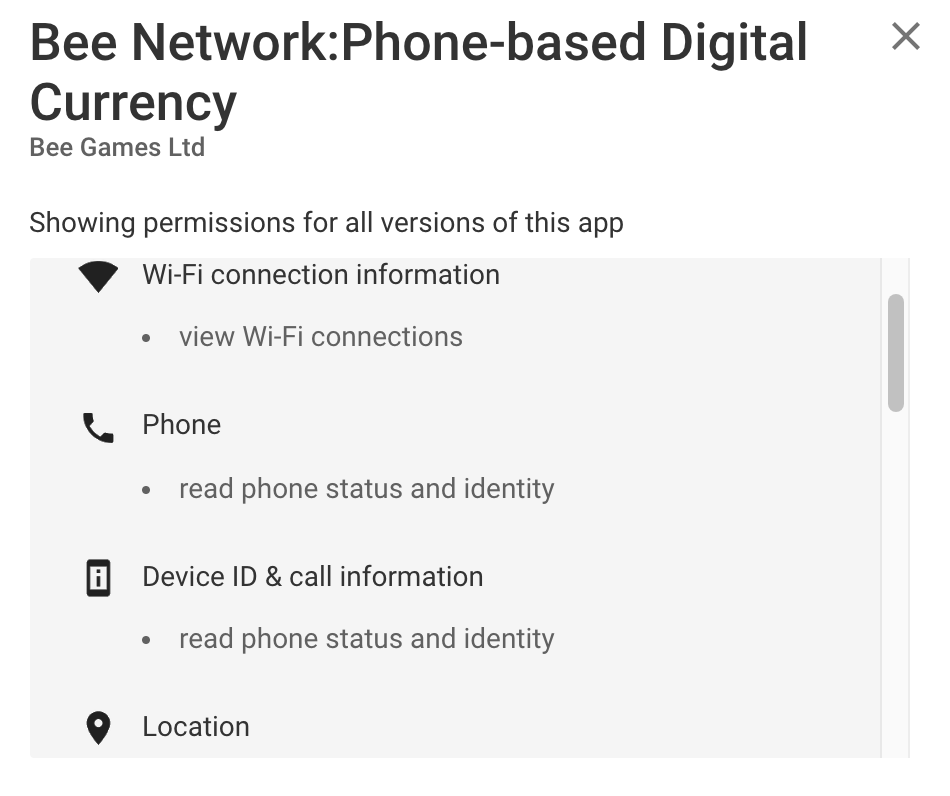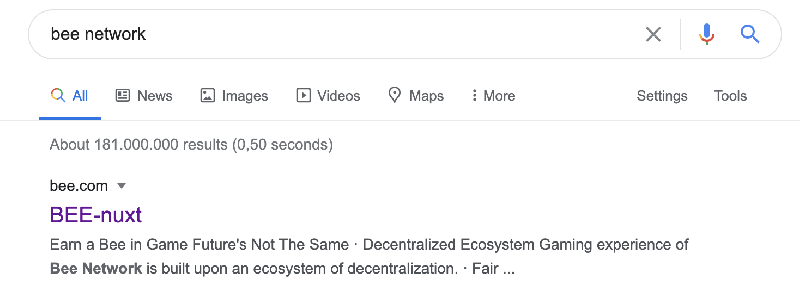Bee Network is an anonymously managed clone of Pi Network
Bee Network may be viewed as an investment (users are investing time to receive monetary rewards in the future) so a disclaimer is necessary:
All investment strategies and investments involve risk of loss. Nothing contained in this website should be construed as investment advice. Any reference to an investment’s past or potential performance is not, and should not be construed as, a recommendation or as a guarantee of any specific outcome or profit.
If the data on your phone, including your contacts and location, have zero value to you and you do not mind the risk of getting your mobile phone infected with potential malware, you can consider installing Bee Network. What you get for this is a possibility that Bee Network, which provides no data on its team, will build a blockchain with valuable coins and allow you to trade them.
Mục Lục
Why am I writing about the Bee Network?
Because I am angry to see an app that looks like a personal data collection operation gain millions of users.
I wrote about other projects like Pi Network because I suspected they would not provide financial value to their users. However, I also noted that the Pi project at least had founders with academic credentials and a team that was working on something. Then, I got comments about bee network from users advertising it as similar to the Pi Network. From what I see online, Bee Network is a clone of the Pi Network idea by an anonymous team which makes it even less likely to be a valuable network.
Then, I saw that the app is not collecting data on the iPhone but is asking for significant user data on Android including users’:
- Location
- Contacts and your callers
- Apps that you use

All permissions requested by the app are listed on Exodus’ analysis and it is the most comprehensive list of permissions we have ever seen on any crypto network app. Another worrying sign was the inclusion of Aurora Mobile’s JPush SDK which collects significant user data and transmits them with non-standard and potentially unsafe encryption mechanisms. Aurora Mobile is based in China and storing EU users’ personal data (e.g. IMEI) with a third party’s servers in China without their explicit consent is against GDPR.
Users can change their own data permission settings for potentially dangerous permissions (e.g. contact information or location collection) for any Android app. Users claim to be able to use the app on Android without any of Android’s dangerous permissions for which user consent is required.
So it is an app built by an anonymous team that attempts to collect significant user information on Android and is unlikely to be of any value to users. So you would expect not anyone to use it right? You would be wrong:
Similar to Pi Network, Bee has a referral marketing model and provides higher digital coins to initial users creating MLM like incentives for users. Based on our qualitative assessment of online comments, people seem to be driven by the desire to make money with very limited effort and are not concerned about their privacy since they already freely provide their data to other companies such as Facebook.
How did it grow so fast?
As a new network offering a free coin that will be monetizable one day, it could be attracting users that didn’t join other such networks (e.g. Pi network) early on. It seems that some people are really into maximizing their virtual currency holding.
Should you be concerned about data privacy if you are already a Facebook/Google user?
Of course. Google and Facebook are legal entities that are bound by laws and user backlash. However, Bee Network is an app that doesn’t even provide an address or the name of a legal entity or person as of Feb/2021 in its terms or privacy policy.
Just because you pay taxes to your government, does not mean that you should also pay taxes when someone asks for it. Just like the more taxes you pay, the poorer you become, the more you give away your data, the more it will fall into hands you do not want. As a result, you will get increasingly targeted marketing offers or potentially scams which may cost your time or money.
So even if you are very excited to gain more virtual currency, we recommend you to ensure that the app does not have any permissions on your phone.
Why am I worried?
This can be another case of mass data harvesting and we have seen such activities disrupt elections and threaten democracies. It has been proven that personal location data collected by apps have been used for military intelligence subcontractors. So when I noticed this network, I couldn’t stand idle as anonymous parties take hold of millions of users’ personal information.
Proponents can claim to know the founding team and claim to have good reasons on why they can’t disclose themselves etc. We can assume for a minute that they are good people, working towards a utopian goal. Even then, we notice that they did not even write a proper title for their website that describes what they are doing. Their current title is “BEE-nuxt” which seems to refer to a a github project for developing websites. This is possibly a default setting in the code base they used to build their website. Would we expect them to protect user data?

After looking more into the network and reading some of the comments, I see that users claim to be able to use the app without sharing their data. If that is the case with you, I am not concerned. The only thing you are risking is your time which I wouldn’t recommend using on a virtual currency launched by an anonymous team but your time is your choice of course.
What are typical arguments by proponents of Bee?
- Claiming that I haven’t read the whitepaper. The whitepaper is a few paragraphs of high level description which makes Pi Networks’ whitepaper (which I criticized for being high level) look like a masterpiece.
- Reminding that bitcoin also had its detractors. Bitcoin was an innovative open source project. Bee is a clone with nothing to show for its technology or benefits. Just because some people were wrong about bitcoin does not mean that every crypto will become a success. There were hundreds of crypto scams including the One Coin.
What is next?
We are considering launching a joke coin just like Doge with the same concept as Pi and Bee Networks:
- Referrers will earn worthless virtual currency
- Early adopters will earn more worthless virtual currency
- The app will try to collect data from users and sell it to the highest bidders under absolute secrecy
- There won’t be any mining. As these apps show us, there is no need to put effort into building a crypto network when people are ready to download your app without one.
This could be a cool experiment to see who is paying for these users data but the experiment would probably be hijacked by scammers and people would end up losing real money like it happened to Dogecoin.
So what should you do?
We explained this in detail on another article but we recommend you to stop chasing promises of free money and do something more productive with your life.
How you can contribute to this discussion?
Please leave a comment, we are open to all viewpoints as long as they are clear, understandable, and avoid inappropriate or immature language.
Though we don’t write much about cryptocurrencies, if you are interested you can also follow our Linkedin page where we cover impact of AI on businesses and individuals or our twitter account.
Cem Dilmegani
Cem has been the principal analyst at AIMultiple since 2017. AIMultiple informs hundreds of thousands of businesses (as per similarWeb) including 55% of Fortune 500 every month.
Cem’s work has been cited by leading global publications including Business Insider, Forbes, Washington Post, global firms like Deloitte, HPE and NGOs like World Economic Forum and supranational organizations like European Commission. You can see more reputable companies and resources that referenced AIMultiple.
Throughout his career, Cem served as a tech consultant, tech buyer and tech entrepreneur. He advised enterprises on their technology decisions at McKinsey & Company and Altman Solon for more than a decade. He also published a McKinsey report on digitalization.
He led technology strategy and procurement of a telco while reporting to the CEO. He has also led commercial growth of deep tech company Hypatos that reached a 7 digit annual recurring revenue and a 9 digit valuation from 0 within 2 years. Cem’s work in Hypatos was covered by leading technology publications like TechCrunch like Business Insider.
Cem regularly speaks at international technology conferences. He graduated from Bogazici University as a computer engineer and holds an MBA from Columbia Business School.
Leave a Reply
YOUR EMAIL ADDRESS WILL NOT BE PUBLISHED. REQUIRED FIELDS ARE MARKED
*
Comment
*
111 Comments
Comment















![Toni Kroos là ai? [ sự thật về tiểu sử đầy đủ Toni Kroos ]](https://evbn.org/wp-content/uploads/New-Project-6635-1671934592.jpg)


